8 Best Types Of Alcohol For Weight Loss While On Dieting 2024
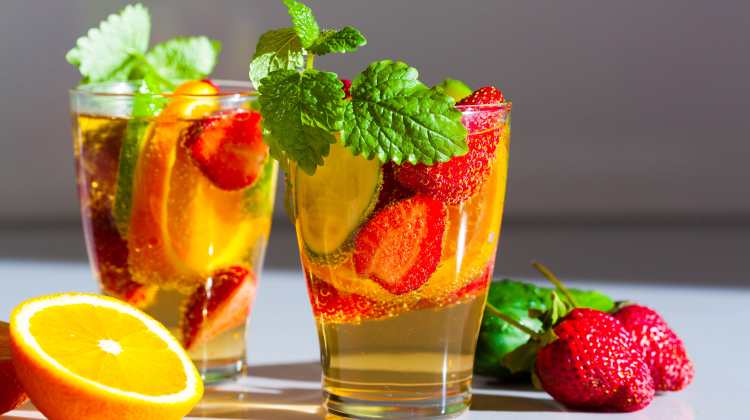
You probably think alcohol and weight loss don’t mix. And–for the most part–you’re right. Most alcohol contains lots of calories and can mess with your metabolism, which isn’t great if you’re trying to lose weight. What’s the point in cutting down on your food intake if you’re likely to overshoot your calorie count with your evening glass of wine?
Luckily, there are some types of low-calorie alcohol that are safe to consume whilst losing weight. You just need to know which types of alcohol provide the least calories (kcal). Well, we did the research for you. Here’s a run-down of the best alcohol for weight loss.
8 Best Alcohol Drinks For Weight Loss
Here are the best 8 low-calorie alcoholic drinks to help you lose weight.
- Light beer
- Red wine
- White wine spritzer
- Gin and light tonic (G&T)
- Whiskey on the rocks
- Rum and diet cola
- Paloma
- Vodka soda and lime juice
Best Low-Calorie Alcoholic Drinks For Weight Loss
In our mission to find the best alcohol for losing weight, we looked at the calorie count for a single serving of many alcoholic beverages. The best alcohol for diet and weight loss are as follows.
Light Beer
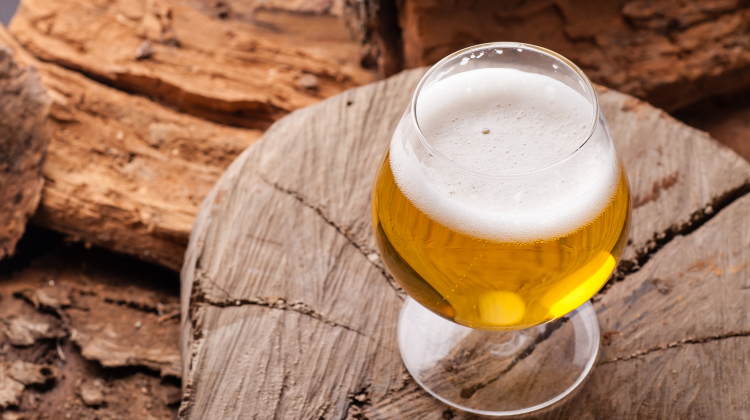
We know too much beer can cause a beer belly, but that’s mainly with “full-fat” beers such as craft beer. But, with only 103 kcal per 12-ounce (oz) can or bottle[1], light beer is the best choice for beer lovers on a weight-loss diet.
However, light beer is high in carbohydrates compared to other low-calorie alcohol. One bottle or can of light beer provides 5.8 g of carbohydrates, making it unsuitable for those on a low-carbohydrate diet – especially if you usually drink more than one can in a session.
If you’re a beer-lover and not a fan of light beer (to be fair, there aren’t many options) read on to discover your other low-calorie alcohol options.
Red Wine
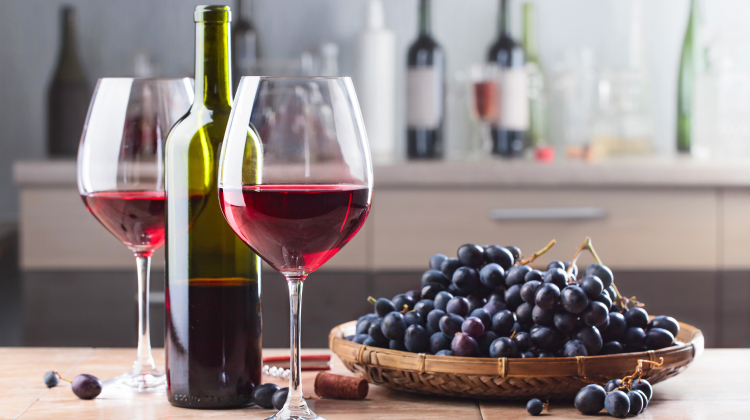
This probably isn’t an option you expected, but some wines can be a low-calorie drink good for weight loss. It depends on the type of wine, though. While red wines might help you lose weight, some types of wine can have the opposite effect.
Most dry red wines are low in calories. For example, a 3.5-oz glass of red wine[2] such as pinot noir provides only 82 kcal.
White Wine Spritzer
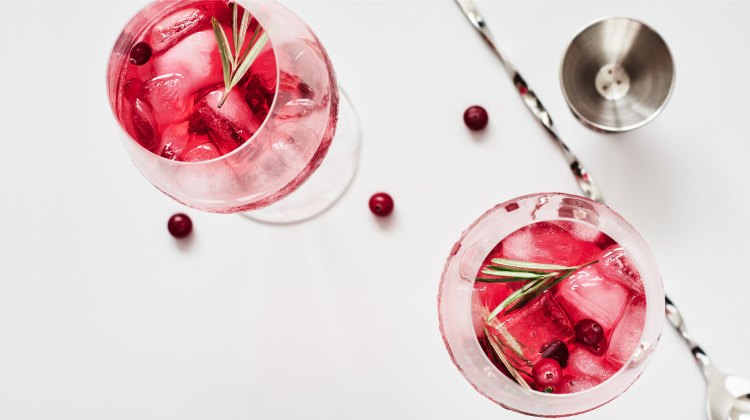
When it comes to white wine, dry white wines are your best option. That’s because it’s “dry” – i.e., not sweet. (If you’re a lover of sweet wines, I’m sorry to say they tend to be quite high in calories, so it’s best to stick to dry wines.)
For example, a small 3.5-ounce (100 ml) glass of sauvignon blanc[3] provides just 81 kcal and only 2 g of carbohydrates. That’s much less than other types of wine – a sweet dessert white wine can contain up to 165 kcal per glass[4].
But, as any wine-lover will confirm, a small glass of wine doesn’t stick around long. So, a nice way to prolong the drink is by adding soda water or club soda to make a wine spritzer. It’s also a refreshing drink – and better for you, too.
Gin And Light Tonic (G&T)
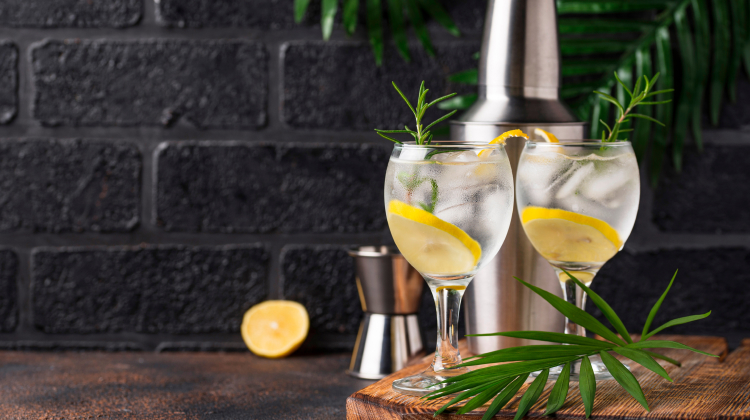
Gin is a distilled juniper berry-flavored alcohol made from fermented grains – usually barley. It’s been produced by Benedictine monks in Italy as early as the 11th century as a “medicinal” drink – hence the juniper berries.
You probably won’t get many medicinal benefits from modern gin, but a good old G&T is still a low-calorie alcoholic drink. A 40 ml serving of 80-proof gin[5] (1.5 oz) provides 97 kcal and almost no carbohydrates. And, if you go for light tonic water without added sugar, there’ll be no almost no added calories. Light Fever Tree, for example, provides 15 kcal per 100 ml and doesn’t contain any synthetic sweeteners.
So, not only do you get more alcohol for your calorie count compared to beer or wine, but with a classic G&T, you’ll keep your carbohydrate intake low.
Whiskey On The Rocks
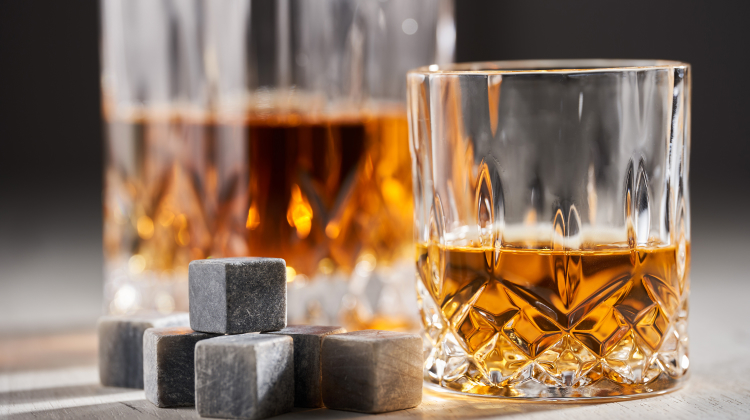
Whisky was the only alcohol allowed during the prohibition era in the United States (US), when all alcohol sales, otherwise, were banned. The loophole? Between 1920-1933, whiskey could be prescribed by a doctor and sold through a licensed pharmacy.
Clearly, the US federal government saw some benefits from whiskey drinking. And it’s true that whiskey is another low-calorie alcoholic beverage that might help you lose weight (compared to other, more calorie-rich, alcohol).
A 40 ml (1.5 oz) serving of 86-proof whiskey[6] is comparable to gin with only 105 kcal. Having it over ice (i.e., on the rocks) is best for your health and calorie intake, but, if you’re not a hardcore whiskey drinker, you could use diet cola as a mixer.
Rum And Diet Cola
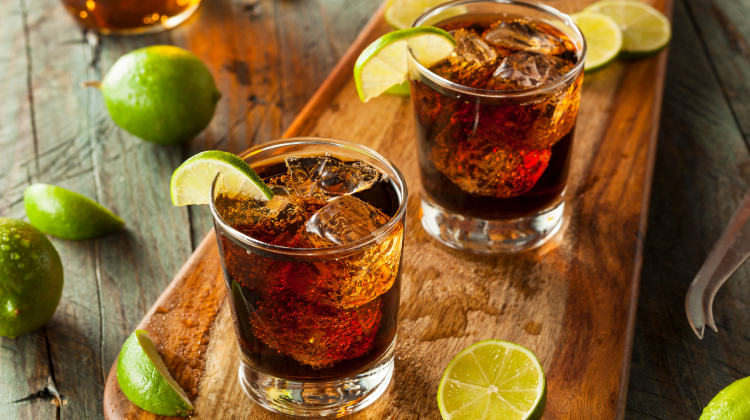
Rum is made by distilling sugarcane juice. So, you’d think rum contains lots of sugar – and, consequently – calories. Luckily, all the sugar is turned into alcohol, making rum another low-calorie spirit. In fact, it’s one of the lowest.
A 40 ml (1.5 oz) serving of 80-proof rum[5] provides 97 kcal. Dark rums are made from caramelized sugar or molasses and have a stronger taste. Dark rum is usually consumed straight or with a strong-tasting mixer such as cola. Light or “silver” rums, on the other hand, have a milder flavor and are preferred for making cocktails.
If you’re looking for a cocktail with rum and cola, try a long-island iced tea.
Paloma
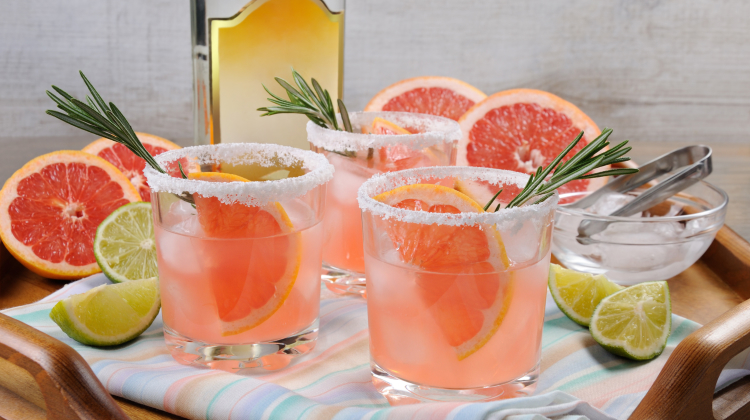
In Mexico, tequila is traditionally consumed straight, but you may be used to downing a shot of tequila with a side of salt and lime. However – if you’re not up for drinking it straight – Paloma is a tasty tequila cocktail made with grapefruit juice, lime juice, and club soda.
Tequila is a spirit originating from the town of Tequila in Mexico and made from blue agave. It’s low in calories with only 97 kcal per 1.5 oz serving[7] and no carbs. Paloma usually has agave syrup or another sweetener added, but you can skip this for a lower-calorie version.
However, there’s another special reason we recommend Paloma for weight loss.
Studies show that grapefruit can be considered a natural treatment to improve metabolism[8]. Grapefruit juice can balance blood sugar levels[9] similarly to the anti-diabetes drug metformin[10], and can lower the levels of fats[11] in your blood, too. Animal studies suggest that grapefruit extract can boost weight loss[12] and protect from weight gain on a high-fat diet.
Vodka Soda And Lime Juice
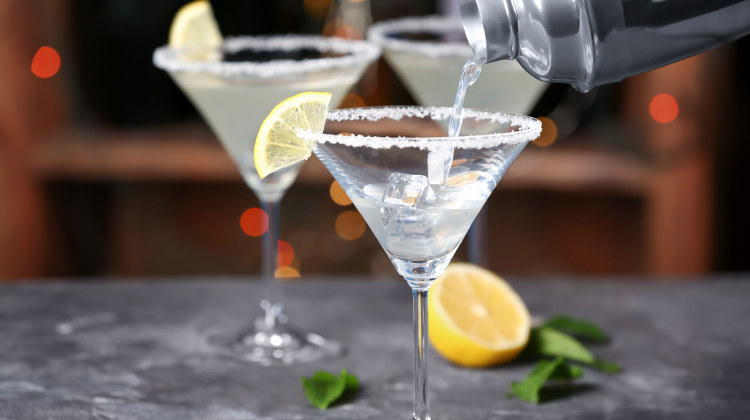
Vodka is composed of ethanol and water with very little added flavor. It can be made from fermenting grains or potatoes.
A classic diet drink, vodka, lime, and soda isn’t just low in calories – it’s tasty too. A 40 ml (1.5 oz) serving of vodka will add 97 kcal[5] to your daily calorie budget. This makes vodka soda the best alcohol drink for weight loss. Being relatively low in sugar, it’s refreshing too.
The classic lime juice is Rose’s lime cordial, which, although it does contain added sugar, only clocks in at 21 kcal per 100 ml of diluted drink. That puts your vodka-lime-soda at a total of 118 kcal per drink.
How Alcohol Affects Your Weight Loss
We’ve all seen an unsightly beer belly. And it’s true: unfortunately, studies show that regular alcohol consumption can promote weight gain[13] for a variety of reasons – including stopping you from burning fat.
This type of weight gain concentrates in the abdominal region, a feature of metabolic syndrome[14] associated with an increased risk of diabetes and heart disease.
High In Calories
The main reason for this weight gain is calories. Alcohol itself (otherwise known as ethanol) contains 7 kcal per gram[15].
Plus, lots of types of alcohol are heavy on sugars and carbohydrates – otherwise known as “empty calories.” So if you drink too much of any type of alcohol, you’ll probably gain weight.
Messes With Your Metabolism
But alcohol consumption does something else that affects your ability to lose weight. Drinking can inhibit fat burning, leading to higher levels of unmetabolized fat floating[16] around your system after a fatty meal.
Drinking alcohol also reduces next-day exercise performance[17], meaning you’ll probably do less exercise and hence burn fewer calories. You’re also more likely to be dehydrated, which further impacts your performance.
Poor Food Choices
We don’t have to tell you that alcohol can make you more snacky. But it’s not because it makes you feel more hungry.
Studies show that people who’ve had an alcoholic drink will eat more food[18] that’s put in front of them – and they’ll usually opt for the least healthy option. It turns out it’s because alcohol reduces your inhibitions, making you more likely “take a day off” from your diet.
Liver Damage
Finally – and this is really bad news if you’re a regular drinker – regularly drinking alcohol eventually damages your liver[19]. This is critical for weight loss because liver disease increases your risk of metabolic syndrome[20], which is associated with weight gain – especially belly fat.
Worst Types of Alcohol For Weight Loss
The good news is that the type of alcohol matters when it comes to weight gain (or loss), and having options allows you to choose wisely. Studies show that drinking beer and some spirits are associated with weight gain while opting for wine is associated with being a healthy weight[21].
We don’t know whether that’s because beer or spirit drinkers simply tend to consume more alcohol or mixers with added sugar (and hence more calories) or whether the wine is somehow protective against weight gain.
Either way, avoiding non-light beer or choosing a small glass of wine to have with your dinner may be the option with the most weight loss and health benefits.
Tips To Avoid Weight Gain While Drinking
Follow these simple tips to avoid weight gain whilst drinking alcohol:
- Opt for low-calorie or diet mixers, such as light tonic
- Top up your drink with club soda wherever possible
- Avoid all types of beer apart from light beers
- Avoid fatty foods whilst drinking
- Don’t skip on exercise the day after drinking alcohol (if you can help it)
- Don’t drink too late at night to avoid messing with your sleep
- Don’t be fooled by weight loss after a night’s alcohol–it’s dehydration
The Bottom Line
Drinking too much alcohol can make you gain weight, but there are some low-calorie alcohol options that can work on a weight-loss diet. Some types of alcohol, such as wine, might even protect you from weight gain.
Nevertheless, make sure that drinking alcohol doesn’t become a habit to keep your liver, metabolism, and weight healthy. Most guidelines suggest drinking one serving of alcohol a maximum of 2-3 nights per week as part of a healthy diet and lifestyle.
+ 21 sources
Health Canal avoids using tertiary references. We have strict sourcing guidelines and rely on peer-reviewed studies, academic researches from medical associations and institutions. To ensure the accuracy of articles in Health Canal, you can read more about the editorial process here
- Usda.gov. (2022). FoodData Central. [online] Available at: https://fdc.nal.usda.gov/fdc-app.html#/food-details/168749/nutrients.
- Usda.gov. (2022). FoodData Central. [online] Available at: https://fdc.nal.usda.gov/fdc-app.html#/food-details/174835/nutrients.
- Usda.gov. (2022). FoodData Central. [online] Available at: https://fdc.nal.usda.gov/fdc-app.html#/food-details/173201/nutrients.
- Usda.gov. (2022). FoodData Central. [online] Available at: https://fdc.nal.usda.gov/fdc-app.html#/food-details/173176/nutrients.
- Usda.gov. (2022). FoodData Central. [online] Available at: https://fdc.nal.usda.gov/fdc-app.html#/food-details/174815/nutrients.
- Usda.gov. (2022). FoodData Central. [online] Available at: https://fdc.nal.usda.gov/fdc-app.html#/food-details/174819/nutrients.
- Usda.gov. (2022). FoodData Central. [online] Available at: https://fdc.nal.usda.gov/fdc-app.html#/food-details/1104491/nutrients.
- Gamboa-Gómez CI;Rocha-Guzmán NE;Gallegos-Infante JA;Moreno-Jiménez MR;Vázquez-Cabral BD;González-Laredo RF (2015). Plants with potential use on obesity and its complications. EXCLI journal, [online] 14. doi:10.17179/excli2015-186.
- Chudnovskiy, R., Thompson, A., Tharp, K., Hellerstein, M., Napoli, J.L. and Stahl, A. (2014). Consumption of Clarified Grapefruit Juice Ameliorates High-Fat Diet Induced Insulin Resistance and Weight Gain in Mice. PLoS ONE, [online] 9(10), p.e108408. doi:10.1371/journal.pone.0108408.
- In (2020). [PH] 744. best alcohol for weight loss_Info – List – In body_1500 – 1600 words. [online] Google Docs. Available at: https://docs.google.com/document/d/18iZoKKMJKhR0UOFcRgFHxUTujIDfgz56dyom5Qj66UI/edit#.
- Silver, H.J., Dietrich, M.S. and Niswender, K.D. (2011). Effects of grapefruit, grapefruit juice and water preloads on energy balance, weight loss, body composition, and cardiometabolic risk in free-living obese adults. Nutrition & Metabolism, [online] 8(1), p.8. doi:10.1186/1743-7075-8-8.
- de la Garza, A.L., Etxeberria, U., Haslberger, A., Aumueller, E., Martínez, J.A. and Milagro, F.I. (2015). Helichrysum and Grapefruit Extracts Boost Weight Loss in Overweight Rats Reducing Inflammation. Journal of Medicinal Food, [online] 18(8), pp.890–898. doi:10.1089/jmf.2014.0088.
- Traversy, G. and Chaput, J.-P. (2015). Alcohol Consumption and Obesity: An Update. Current Obesity Reports, [online] 4(1), pp.122–130. doi:10.1007/s13679-014-0129-4.
- NHLBI, NIH. (2022). What Is Metabolic Syndrome? [online] Available at: https://www.nhlbi.nih.gov/health/metabolic-syndrome.
- Sayon-Orea, C., Martinez-Gonzalez, M.A. and Bes-Rastrollo, M. (2011). Alcohol consumption and body weight: a systematic review. Nutrition Reviews, [online] 69(8), pp.419–431. doi:10.1111/j.1753-4887.2011.00403.x.
- Suter, P.M. and Schutz, Y. (2008). The effect of exercise, alcohol or both combined on health and physical performance. International Journal of Obesity, [online] 32(S6), pp.S48–S52. doi:10.1038/ijo.2008.206.
- Paulucio, D., Costa, B.M., Santos, C.G.M., Nogueira, F., Koch, A., Machado, M., Velasques, B., Ribeiro, P. and Pompeu, F.A. (2017). Taurine supplementation improves economy of movement in the cycle test independently of the detrimental effects of ethanol. Biology of Sport, [online] 34(4), pp.353–359. doi:10.5114/biolsport.2017.69823.
- Kase, C.A., Piers, A.D., Schaumberg, K., Forman, E.M. and Butryn, M.L. (2016). The relationship of alcohol use to weight loss in the context of behavioral weight loss treatment. Appetite, [online] 99, pp.105–111. doi:10.1016/j.appet.2016.01.014.
- Baraona E;Lieber CS (2019). Effects of ethanol on lipid metabolism. Journal of lipid research, [online] 20(3). Available at: https://pubmed.ncbi.nlm.nih.gov/87483/.
- Han, A.L. (2021). Association of Cardiovascular Risk Factors and Metabolic Syndrome with non-alcoholic and alcoholic fatty liver disease: a retrospective analysis. BMC Endocrine Disorders, [online] 21(1). doi:10.1186/s12902-021-00758-x.
- Sayon-Orea, C., Bes-Rastrollo, M., Nuñez-Cordoba, J.M., Basterra-Gortari, F.J., Beunza, J.J. and Martinez-Gonzalez, M.A. (2011). Type of alcoholic beverage and incidence of overweight/obesity in a Mediterranean cohort: The SUN project. Nutrition, [online] 27(7-8), pp.802–808. doi:10.1016/j.nut.2010.08.023.



